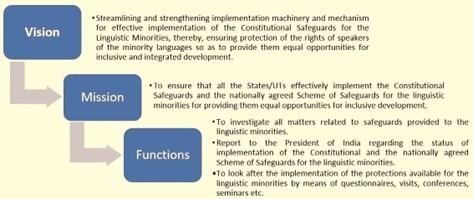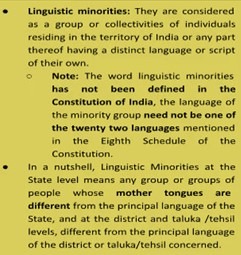Special Officer for Linguistic Minorities
Constitutional Provisions for Linguistic Minorities
The Constitution of India originally did not provide for a specific mechanism to address the needs and rights of linguistic minorities. However, in response to recommendations from the States Reorganisation Commission (1953-55), the Seventh Constitutional Amendment Act of 1956 introduced Article 350-B in Part XVII of the Constitution, establishing the framework for the protection and support of linguistic minorities.
Key Provisions of Article 350-B
1. Establishment of a Special Officer:
- Article 350-B mandates the appointment of a Special Officer for Linguistic Minoritiesby the President of India.
2. Duties of the Special Officer:
- The Special Officer is responsible for investigating matters related to the constitutional safeguards provided for linguistic minorities.
- The Officer reports to the President at intervals specified by the President, who is tasked with placing the reports before both Houses of Parliament and forwarding them to the respective state governments.
3. Lack of Specification:
- The Constitution does not delineate the qualifications, tenure, salaries, and allowances, nor the process for removing the Special Officer.
Commissioner for Linguistic Minorities
In line with Article 350-B, the office of the Special Officer for Linguistic Minorities was established in 1957, with the officer designated as the Commissioner for Linguistic Minorities.
Structure and Locations
- Headquarters: The Commissioner’s office is based in Allahabad (Uttar Pradesh).
- Regional Offices: There are three regional offices located in:
- Belgaum (Karnataka)
- Chennai (Tamil Nadu)
- Kolkata (West Bengal)
Each regional office is headed by an Assistant Commissioner.
Staff Framework
- The Commissioner is supported by a Deputy Commissioner and an Assistant Commissioner at headquarters.
- Liaison is maintained with state governments and Union Territories through nodal officers appointed by these entities.
Reporting Structure
- The Commissioner falls under the Ministry of Minority Affairs at the Central level, submitting annual and other reports to the President through the Union Minority Affairs Minister.
Role of the Commissioner
The Commissioner addresses grievances related to the implementation of constitutional and national safeguards for linguistic minorities:
1. Complaints and Investigations:
- The Commissioner investigates complaints and issues regarding the non-implementation of safeguards.
- This includes grievances brought forth by individuals, groups, or organizations.
2. Promotion and Awareness:
- The Ministry of Minority Affairs has urged state governments and UT administrations to publicize the constitutional safeguards available to linguistic minorities and implement necessary administrative measures.
3. 10-Point Programme:
- The Commissioner has initiated a 10-point programmeaimed at enhancing governmental initiatives for the preservation of language and culture among linguistic minorities.
Vision and Mission
- Vision: To streamline and strengthen the implementation mechanisms for effective execution of constitutional safeguards for linguistic minorities, ensuring protection of rights and fostering equal opportunities for inclusive development.
- Mission: To ensure that all states and UTs effectively implement constitutional safeguards and nationally agreed schemes for linguistic minorities, facilitating equal opportunities for inclusive development.
Functions and Objectives
Functions
1. Investigate all matters related to safeguards for linguistic minorities.
2. Submit reports on the status of implementation of constitutional and agreed safeguards to the President of India.
3. Monitor implementation through various methods, such as questionnaires, visits, conferences, seminars, and review mechanisms.
Objectives
1. Provide equal opportunities for inclusive development and national integration for linguistic minorities.
2. Promote awareness of available safeguards among linguistic minorities.
3. Ensure effective implementation of constitutional and other agreed safeguards for linguistic minorities by states and UTs.
4. Address grievances related to the safeguards for linguistic minorities efficiently.
Issues Related to Linguistic Minorities in India
Definition: Neither the Constitution nor any piece of legislation defines linguistic minorities.
- According to the Report of the National Commission for Religious and Linguistic Minorities (NCRLM), the linguistic minority status of a community is determined by numerical inferiority, non-dominant status in a state, and possessing a distinct identity.
- The term linguistic minority must be defined properly and such a definition should then be used while framing a law to provide affirmative action based on socio-economic backwardness.
Causes Socio-economic Backwardness: As per the report (NCRLM) exclusive adherence to a minority language is a leading factor that contributes to socio-economic backwardness.
- The Commission has suggested that there is a need to develop mechanisms and institutional structures to accommodate linguistic minorities so that they do not fall into the traps of socio-economic backwardness merely because of the language they speak.
Vulnerability: The vulnerability of the particular language to extinction, lack of institutional support to develop, sustain, and promote a language.
- As per the UNESCO Atlas of the World’s Languages in Danger, currently 197 languages are endangered or on the way to extinction in India.
Dominance of Majority Language: Individuals and communities learn the majority language to survive and improve their socio-economic status.
- However, available affirmative action can only be effectively utilised by the students of indigenous linguistic minorities if their medium of instruction is their own language and English/majority regional language is taught comprehensively as a second language.
Safeguard to Linguistic Minorities
The safeguards for linguistic minorities derive their authority from two sources:
The Constitution of India:
- Article 29: Any section of the citizens residing in the territory of India or any part thereof having a distinct language, script, or culture of its own shall have the right to conserve the same.
- Article 30: All minorities, whether based on religion or language, shall have the right to establish and administer educational institutions of their choice.
- Article 347: On a demand being made on that behalf, the President may, if he is satisfied that a substantial proportion of the population of a State desires the use of any language spoken by them to be recognized by that State, direct that such language shall also be officially recognized throughout that state or any part thereof for such purpose as he may specify.
- Article 350: Every person shall be entitled to submit a representation for the redress of any grievance to any officer or authority of the Union or a State in any of the languages used in the Union or in the State, as the case may be.
- Article 350 A: It shall be the endeavour of every State and every local authority within the State to provide adequate facilities for instruction in the mother tongue at the primary stage of education to children belonging to linguistic minority groups, and the President may issue such directions to any State as he considers necessary or proper for securing the provision of such facilities.
- Article 350 B: There shall be a Special Officer for linguistic minorities to be appointed by the President to investigate all matters relating to the safeguards provided for linguistic minorities under this Constitution and report to the President.
- Ministry of Minority Affairs, Government of India, “Scheme of Consensual Safeguards for Linguistic Minorities” (2023):
- Translation and Publication in Minority Languages: Provision for the translation and publication of rules, regulations, notices, etc., in minority languages in areas where their speakers constitute 15% or more of the local population.
- Declaration of Minority Languages as Second Official Language: Declaration of minority languages as a second official language in districts where their speakers constitute 60% or more of the population.
- Instruction in Mother Tongue at the Primary Stage: Provision for instruction through the mother tongue at the primary stage of education.
- Instruction in Minority Languages at the Secondary Stage: Provision for instruction through minority languages at the secondary stage of education.
- Responsibility for Safeguarding Linguistic Minorities: The basic responsibility for safeguarding linguistic minorities lies with the State Governments and Union Territory (UT) Administrations, which are required to appoint nodal officers for linguistic minorities.
- Their active cooperation is essential for protecting the interests of linguistic minorities.
The Commissioner for Linguistic Minorities plays a vital role in safeguarding the rights and interests of linguistic minorities in India. By investigating grievances, promoting awareness, and ensuring that constitutional safeguards are effectively implemented, the Commissioner contributes to the preservation of the linguistic heritage and the equitable treatment of minority communities within the framework of the Indian Constitution.






